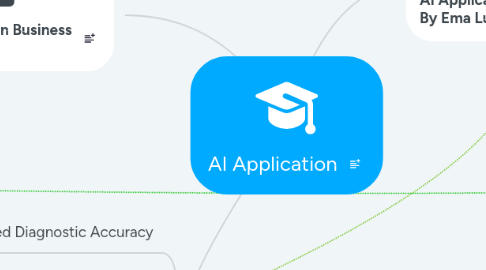
1. AI Application in Business By Elysse Bell
1.1. Accounting
1.1.1. Accounting software tools now use AI to create cash flow projections or categorize transactions, with applications for tax, payroll, and financial forecasting. It can help reduce input errors, catch duplicate or suspicious transactions, and identify opportunities to save money.
1.1.1.1. Challenges and Ethical Considerations for Implementing AI
1.1.1.1.1. AI applications raises urgent concerns around the ethics, privacy, and security of the technology. Governance of AI technology must consider how to develop and expand current legislation around privacy and data protection
1.1.1.1.2. Human oversight is required to review and interpret the results it generates and monitor how it is generating them, lest it end up reproducing or worsening current and historical biases and patterns of discrimination.
1.1.1.2. Skill Gaps and Workforce Transformation
1.1.1.2.1. AI can bridge skill gaps by offering workers access to skill sets like coding, translating, and writing. As a rapidly advancing and developing technology, training and keeping up with knowledge about AI tools can be a challenge for workers and businesses alike.
1.2. Sales and Marketing
1.2.1. Sales and marketing departments can use AI for a wide range of possibilities, including incorporating it into CRM, email marketing, social media, and advertising software. Generative AI can create all kinds of creative and useful content, such as scripts, social media posts, blog articles, design assets, and more.
2. AI Application in Healthcare By Maryna Shuliak
2.1. Enhanced Diagnostic Accuracy
2.1.1. AI algorithms can analyze large datasets of medical records, images, and diagnostic tests to assist medical clinics in more accurate and timely diagnosis. This can lead to preventive disease detection and improved treatment outcomes.
2.2. Efficient Administrative Tasks
2.2.1. AI streamlines administrative tasks by automating scheduling appointments, managing medical records, and processing billing. This efficiency frees up healthcare professionals’ time, reduces administrative burdens, and minimizes errors, allowing them to focus more on patient care.
3. AI Application in Education By Ema Lukan
3.1. Personalization
3.1.1. AI allows adapting study materials to the level of each student. This means that each individual can learn at their own pace, strengthening their weaknesses and advancing in areas where they show greater ability.
3.2. Administrative efficiency
3.2.1. Educational institutions can use AI to automate administrative tasks, allowing educators to focus more on teaching and less on bureaucracy.
